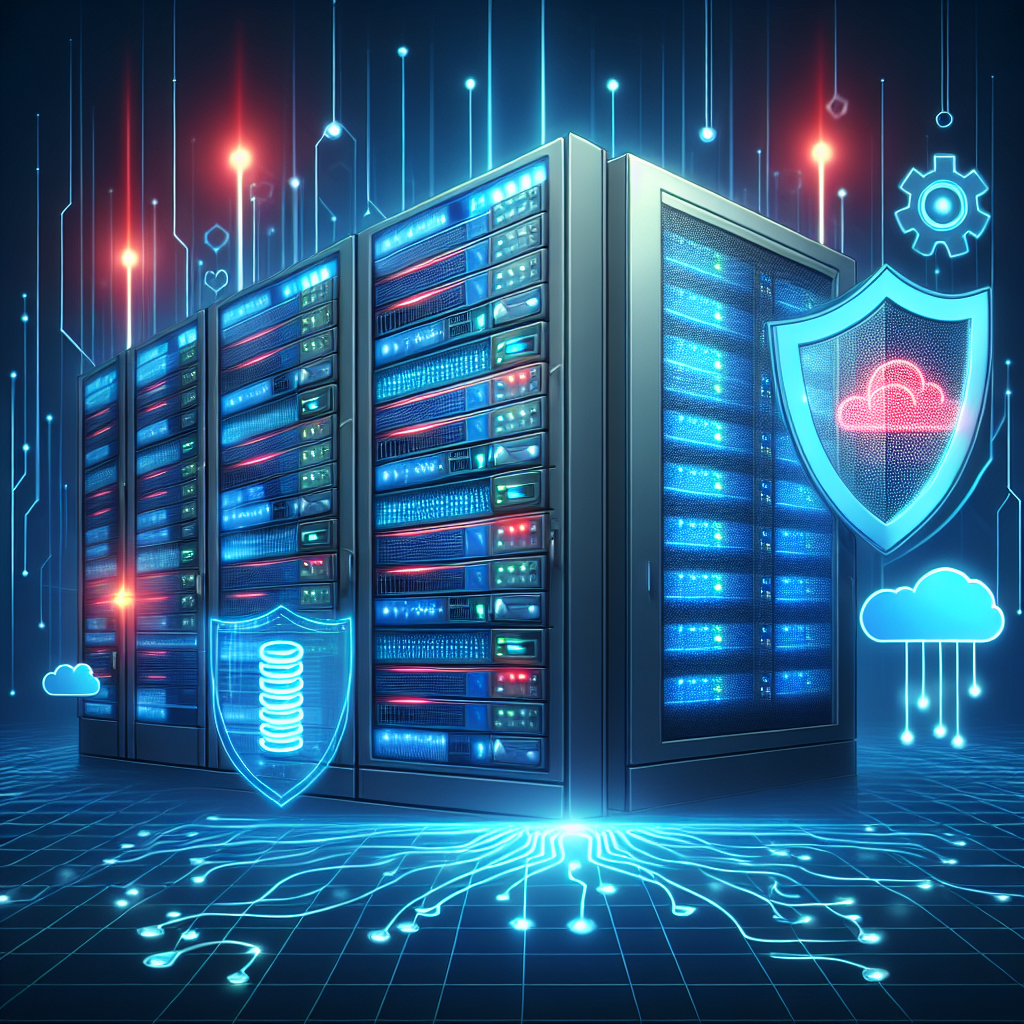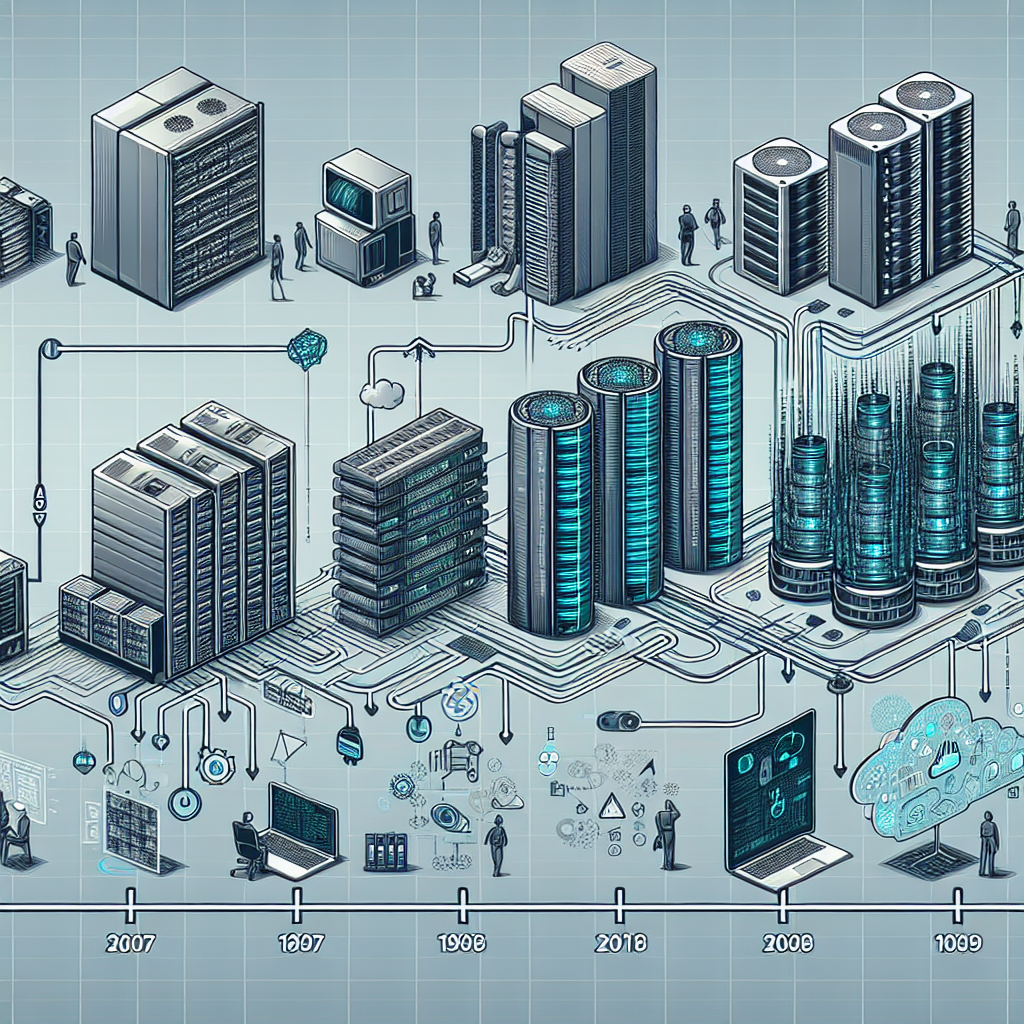Your cart is currently empty!
Tag: Business

Investing in Data Center Resilience: How to Protect Your Business from Downtime Disasters
In today’s digital age, data centers play a crucial role in the operations of businesses of all sizes. These facilities house the servers, storage, and networking equipment that store and process the massive amounts of data that companies rely on to conduct their day-to-day operations. As such, ensuring that data centers are resilient and able to withstand potential disasters is essential for protecting the continuity of business operations.Downtime disasters, such as power outages, equipment failures, natural disasters, and cyberattacks, can have a significant impact on a company’s bottom line. According to a recent study, the average cost of data center downtime is over $740,000 per incident. This figure does not even account for the potential loss of customers and damage to a company’s reputation that can result from extended periods of downtime.
Investing in data center resilience is therefore a critical priority for businesses looking to safeguard their operations and minimize the risk of downtime disasters. There are several key strategies that companies can employ to protect their data centers and ensure business continuity:
1. Redundant Power and Cooling Systems: Power outages and cooling failures are among the most common causes of data center downtime. Implementing redundant power and cooling systems can help ensure that critical infrastructure remains operational in the event of a failure.
2. Geographic Diversity: Distributing data centers across multiple geographic locations can help protect against natural disasters, such as hurricanes, earthquakes, and floods. By spreading out infrastructure, companies can minimize the risk of a single point of failure bringing down the entire operation.
3. Data Backup and Recovery: Regularly backing up data and implementing a robust disaster recovery plan is essential for mitigating the impact of downtime disasters. By storing backups offsite or in the cloud, companies can quickly recover data in the event of a catastrophic failure.
4. Security Measures: Cyberattacks are an ever-present threat to data center operations. Implementing strong security measures, such as firewalls, intrusion detection systems, and encryption, can help protect against unauthorized access and data breaches.
5. Regular Maintenance and Testing: Regularly testing and maintaining data center infrastructure is essential for identifying and addressing potential vulnerabilities before they lead to downtime disasters. Conducting regular audits and assessments can help ensure that systems are operating at peak performance.
Investing in data center resilience is not only a prudent business decision but also a critical step in safeguarding the continuity of operations. By implementing redundant systems, geographic diversity, data backup and recovery measures, security protocols, and regular maintenance and testing, companies can protect their data centers from downtime disasters and ensure business continuity in the face of unexpected events.

The Evolution of Business Continuity in Data Center Management
In today’s technology-driven world, data centers play a crucial role in the operations of businesses of all sizes. These facilities house the servers, storage, and networking equipment that store and process the vast amounts of data needed to run modern organizations. As such, ensuring the continuity of operations in data centers is paramount to the success of a business.Over the years, the concept of business continuity in data center management has evolved significantly. In the early days of data centers, companies focused primarily on disaster recovery planning, which involved creating backup copies of data and systems to be used in the event of a catastrophic event. While this approach was sufficient for many years, the increasing complexity and interconnectedness of data center systems necessitated a more comprehensive approach to business continuity.
Today, business continuity in data center management encompasses a wide range of strategies and technologies aimed at ensuring the uninterrupted operation of critical business functions. This includes not only disaster recovery planning, but also proactive measures to prevent downtime and minimize the impact of potential disruptions.
One key aspect of modern business continuity in data center management is redundancy. This involves duplicating critical components of the data center infrastructure to ensure that if one system fails, another can seamlessly take its place. Redundancy can be built into every aspect of a data center, from power supplies and cooling systems to networking equipment and storage arrays.
Another important aspect of business continuity in data center management is monitoring and automation. With the increasing complexity of data center systems, it is essential to have real-time visibility into the performance of all components. This allows data center operators to quickly identify and address potential issues before they escalate into full-blown outages. Automation tools can also play a key role in ensuring the continuity of operations by automatically responding to events and failures without human intervention.
In addition to redundancy and monitoring, businesses are also increasingly turning to cloud-based solutions for business continuity in data center management. Cloud services offer a scalable and cost-effective way to replicate data and applications in multiple locations, providing an added layer of protection against downtime and data loss.
Overall, the evolution of business continuity in data center management reflects the growing importance of data centers in today’s business landscape. By adopting a comprehensive approach to business continuity that includes redundancy, monitoring, automation, and cloud-based solutions, organizations can ensure the uninterrupted operation of their critical systems and safeguard against potential disruptions.

The Impact of Data Center Inspections on Overall Business Continuity and Resilience
In today’s digital age, data centers play a crucial role in ensuring the smooth functioning of businesses. These facilities house the servers, networking equipment, and storage systems that store and process the vast amounts of data that organizations rely on to operate. With the increasing reliance on technology for day-to-day operations, the importance of data center inspections cannot be understated.Data center inspections are essential for ensuring that these facilities are operating at peak efficiency and are in compliance with industry regulations and best practices. Regular inspections help identify potential issues before they escalate into major problems that could disrupt business operations. By proactively addressing any issues that arise during inspections, organizations can minimize downtime and ensure the continuity of their business operations.
One of the key benefits of data center inspections is the impact they have on overall business continuity and resilience. By regularly assessing the condition of their data centers, organizations can identify vulnerabilities and implement measures to mitigate risks. This proactive approach helps organizations prevent potential disruptions and ensures that their critical data and systems are protected.
In addition, data center inspections help organizations improve the efficiency and performance of their facilities. By identifying areas for improvement, organizations can optimize their data center operations and ensure that they are operating at peak efficiency. This not only helps organizations save time and money but also enhances their ability to meet the growing demands of their customers.
Furthermore, data center inspections are essential for ensuring compliance with industry regulations and standards. Failure to meet these requirements can result in costly fines and damage to an organization’s reputation. By conducting regular inspections, organizations can demonstrate their commitment to data security and compliance, which can help build trust with customers and stakeholders.
Overall, the impact of data center inspections on business continuity and resilience cannot be overstated. By proactively assessing the condition of their data centers and implementing measures to address any issues that arise, organizations can minimize downtime, improve efficiency, and ensure compliance with industry regulations. In today’s fast-paced and technology-driven business environment, data center inspections are a critical component of maintaining a resilient and reliable infrastructure.

The Impact of Data Center Repair on Business Continuity
Data centers play a crucial role in today’s digital world, serving as the backbone of many businesses’ operations. These facilities house the servers, storage devices, and networking equipment that store and process vast amounts of data. However, like any other piece of technology, data centers are not immune to failures and malfunctions. When a data center experiences a problem that requires repair, the impact on business continuity can be significant.One of the most immediate impacts of data center repair on business continuity is downtime. When a data center goes offline due to a hardware failure or other issue, it can bring a company’s operations to a screeching halt. Without access to the data and applications hosted in the data center, employees may be unable to perform their work, customers may not be able to access services, and revenue streams may be disrupted. In today’s fast-paced business environment, even a few hours of downtime can have a ripple effect that can be felt for days or even weeks.
In addition to downtime, data center repair can also have financial implications for a business. The cost of repairing or replacing hardware, as well as the lost revenue and productivity resulting from downtime, can add up quickly. According to a study by the Ponemon Institute, the average cost of data center downtime is around $9,000 per minute. For a large organization, this can translate to millions of dollars in losses.
Furthermore, data center repair can also have a negative impact on a company’s reputation and customer relationships. If customers are unable to access services or experience delays due to a data center issue, they may become frustrated and seek out alternative providers. This can result in a loss of business and damage to the company’s brand image.
To mitigate the impact of data center repair on business continuity, companies should have a robust disaster recovery plan in place. This plan should include measures such as regular data backups, redundant hardware and infrastructure, and clear protocols for responding to and resolving data center issues. By proactively planning for potential disruptions, businesses can minimize downtime, financial losses, and damage to their reputation.
In conclusion, the impact of data center repair on business continuity can be significant and far-reaching. Downtime, financial losses, and damage to reputation are just a few of the potential consequences of a data center issue. By implementing a comprehensive disaster recovery plan and taking proactive measures to prevent and address data center problems, businesses can minimize the impact of repair on their operations and ensure continuity in the face of adversity.

The Business Case for Investing in Data Center Uptime
In today’s digital age, data centers play a crucial role in supporting the operations of businesses of all sizes. These facilities house the servers, storage, and networking equipment that store and process the vast amounts of data generated by organizations. As such, ensuring the uptime of data centers is essential for maintaining business continuity and preventing costly downtime.Investing in data center uptime not only helps organizations avoid potential financial losses from downtime but also provides several other benefits that can positively impact the bottom line. Here are some compelling reasons why businesses should prioritize uptime in their data center investments:
1. Enhanced reliability and performance: Data center uptime is a measure of how consistently a data center is available and operational. By investing in technologies and infrastructure that improve uptime, businesses can ensure that their critical systems and applications are always accessible and perform at optimal levels. This can lead to increased productivity, improved customer satisfaction, and greater competitive advantage in the marketplace.
2. Cost savings: Downtime can be extremely costly for businesses, leading to lost revenue, decreased productivity, and potential damage to brand reputation. Investing in data center uptime can help mitigate these risks and save organizations money in the long run. By proactively addressing potential causes of downtime, such as power outages, hardware failures, or network disruptions, businesses can avoid the high costs associated with unplanned downtime and its aftermath.
3. Regulatory compliance: Many industries are subject to strict regulatory requirements regarding data security, privacy, and availability. Ensuring data center uptime is crucial for meeting these compliance standards and avoiding potential penalties for non-compliance. By investing in uptime, businesses can demonstrate their commitment to data protection and regulatory compliance, building trust with customers and stakeholders.
4. Scalability and flexibility: As businesses grow and evolve, their data center needs may change. Investing in data center uptime allows organizations to scale their infrastructure to accommodate growth and adapt to changing business requirements. By implementing redundant systems, backup power sources, and other uptime-enhancing technologies, businesses can future-proof their data center investments and ensure that they can easily scale their operations as needed.
5. Competitive advantage: In today’s fast-paced business environment, downtime is simply not an option. Organizations that prioritize uptime and invest in robust data center infrastructure gain a competitive edge by ensuring that they can deliver reliable services to customers and partners. By differentiating themselves from competitors through superior uptime and performance, businesses can attract and retain customers, drive revenue growth, and strengthen their market position.
In conclusion, the business case for investing in data center uptime is clear. By prioritizing uptime and proactively addressing potential causes of downtime, businesses can enhance reliability, improve performance, save costs, ensure compliance, and gain a competitive advantage in the marketplace. Investing in data center uptime is not just a smart business decision – it is essential for the success and longevity of organizations in today’s digital economy.

Maximizing the Benefits of Data Center Audits for Business Continuity
In today’s digital age, data centers play a crucial role in ensuring the smooth operation of businesses. With the increasing reliance on technology, it has become imperative for companies to prioritize business continuity and disaster recovery plans. One way to ensure the resilience of a data center is through regular audits.Data center audits are comprehensive assessments of an organization’s IT infrastructure, systems, and processes. These audits help identify potential vulnerabilities, assess risks, and ensure compliance with industry standards and regulations. By conducting regular audits, businesses can maximize the benefits of their data center and enhance their overall business continuity strategies.
One of the key benefits of data center audits is the identification of weaknesses and vulnerabilities in the IT infrastructure. Auditors can pinpoint areas that need improvement, such as outdated hardware, software vulnerabilities, or inadequate disaster recovery plans. By addressing these weaknesses, businesses can strengthen their data center’s resilience and minimize the risk of downtime or data loss.
Data center audits also help businesses ensure compliance with industry regulations and standards. Many industries, such as healthcare and finance, have strict data security and privacy requirements that companies must adhere to. By conducting regular audits, businesses can demonstrate their commitment to compliance and avoid costly fines or legal consequences.
Furthermore, data center audits can help businesses optimize their IT infrastructure and processes. Auditors can identify inefficiencies or redundancies in the data center, recommend best practices, and help streamline operations. By implementing these recommendations, businesses can improve performance, reduce costs, and enhance overall productivity.
In addition to these benefits, data center audits also provide businesses with peace of mind. By knowing that their IT infrastructure is secure and resilient, companies can focus on their core business activities without worrying about potential disruptions or data breaches. This sense of security can boost employee morale, customer trust, and overall business success.
In conclusion, data center audits are essential for maximizing the benefits of business continuity. By identifying weaknesses, ensuring compliance, optimizing infrastructure, and providing peace of mind, audits help businesses enhance their data center’s resilience and ensure the smooth operation of their IT systems. Investing in regular audits is a wise decision for any company looking to protect their data, reputation, and bottom line.

The Business Case for Investing in Data Center Energy Efficiency
Data centers are the backbone of the digital economy, powering everything from social media platforms to online shopping sites. As the demand for data continues to grow exponentially, so does the energy consumption of data centers. In fact, data centers are estimated to consume about 3% of the world’s electricity supply.With such a significant impact on energy consumption, it’s no surprise that many businesses are looking for ways to improve the energy efficiency of their data centers. Not only does this help reduce their carbon footprint and environmental impact, but it can also lead to substantial cost savings in the long run.
There are several reasons why investing in data center energy efficiency makes good business sense. First and foremost, reducing energy consumption can lead to lower operating costs. By implementing energy-saving technologies and best practices, businesses can significantly decrease their electricity bills and improve their bottom line.
Furthermore, energy-efficient data centers are more reliable and resilient. By optimizing cooling systems, improving airflow, and implementing energy management tools, businesses can ensure that their data centers run smoothly and avoid costly downtime due to overheating or power failures.
In addition, investing in data center energy efficiency can also help businesses meet their sustainability goals and enhance their corporate reputation. As consumers and investors become increasingly concerned about environmental issues, companies that demonstrate a commitment to sustainability are more likely to attract and retain customers and stakeholders.
Moreover, government regulations and incentives are pushing businesses to adopt energy-efficient practices. By investing in data center energy efficiency, businesses can not only comply with regulatory requirements but also take advantage of financial incentives and tax breaks that reward sustainable practices.
Overall, the business case for investing in data center energy efficiency is clear. By reducing operating costs, improving reliability, enhancing sustainability, and complying with regulations, businesses can benefit in multiple ways from optimizing the energy efficiency of their data centers. In today’s digital age, investing in energy efficiency is not just a smart business decision – it’s a strategic imperative for long-term success.

How Data Center Business Continuity Impacts Overall Organizational Resilience
Data centers play a critical role in ensuring the smooth operation of organizations in today’s digital age. They house the servers, storage systems, and networking equipment that store and process large amounts of data, making them essential for businesses to function effectively. However, data centers are not immune to disruptions, whether due to natural disasters, power outages, or cyberattacks. This is where business continuity planning comes into play.Business continuity planning is the process of creating a roadmap for how an organization will continue to operate during and after a disruption. This includes identifying critical functions, resources, and dependencies, as well as developing strategies to mitigate risks and ensure the organization can quickly recover and resume normal operations.
When it comes to data centers, business continuity planning is crucial for ensuring the resilience of the organization as a whole. Here’s how data center business continuity impacts overall organizational resilience:
1. Minimizing Downtime: Downtime can be costly for organizations, leading to lost revenue, decreased productivity, and damage to reputation. By having a solid business continuity plan in place for the data center, organizations can minimize downtime and ensure that critical systems and services remain operational even in the face of disruptions.
2. Protecting Data: Data is one of the most valuable assets for organizations, and any loss or corruption can have serious consequences. Business continuity planning for data centers includes measures to protect data, such as regular backups, data encryption, and disaster recovery solutions. This helps organizations safeguard their data and ensure that it remains available and secure in the event of a disruption.
3. Ensuring Compliance: Many industries have strict regulations governing data security and privacy, such as GDPR in Europe or HIPAA in the United States. Data center business continuity planning helps organizations ensure compliance with these regulations by implementing the necessary security measures and controls to protect sensitive data.
4. Enhancing Flexibility: A well-thought-out business continuity plan for the data center enables organizations to adapt quickly to changing circumstances and recover from disruptions more effectively. This flexibility is essential for maintaining operational resilience and responding to unexpected events, such as pandemics or cyberattacks.
5. Building Trust: In today’s interconnected world, trust is essential for maintaining relationships with customers, partners, and stakeholders. By demonstrating a commitment to business continuity planning for the data center, organizations can build trust and confidence in their ability to weather disruptions and continue to deliver products and services reliably.
In conclusion, data center business continuity planning is a critical component of overall organizational resilience. By protecting data, minimizing downtime, ensuring compliance, enhancing flexibility, and building trust, organizations can strengthen their ability to withstand disruptions and thrive in an increasingly complex and uncertain business environment. Investing in business continuity planning for the data center is not just a good practice—it’s a strategic imperative for organizations looking to secure their future success.

The Cost of Downtime: Why Data Center Disaster Recovery is Essential for Every Business
In today’s digital age, businesses rely heavily on their data centers to store and manage critical information. From customer data to financial records, organizations of all sizes depend on their data centers to keep their operations running smoothly. However, what happens when disaster strikes and the data center goes down? The cost of downtime can be staggering, both in terms of financial losses and damage to a company’s reputation.Data center downtime can occur for a variety of reasons, including natural disasters, power outages, equipment failures, cyber attacks, and human error. Regardless of the cause, the impact of downtime can be devastating. According to a study by the Ponemon Institute, the average cost of data center downtime is $9,000 per minute. For a large enterprise, this can add up to millions of dollars in lost revenue and productivity.
In addition to the financial impact, downtime can also have serious consequences for a company’s reputation. Customers expect businesses to be available 24/7, and any disruption in service can lead to frustration and loss of trust. In today’s competitive market, a company that experiences frequent downtime may find itself losing customers to competitors who are able to provide a more reliable service.
This is where data center disaster recovery comes into play. Disaster recovery involves implementing a set of policies, procedures, and technologies to ensure that critical data and systems can be quickly restored in the event of a disaster. By having a comprehensive disaster recovery plan in place, businesses can minimize the impact of downtime and ensure that their operations can resume as quickly as possible.
There are a variety of disaster recovery solutions available, ranging from traditional backup and restore methods to more advanced technologies such as cloud-based disaster recovery services. The key is to tailor the disaster recovery plan to the specific needs and budget of the business. By investing in a robust disaster recovery solution, businesses can protect themselves against the potentially devastating consequences of downtime.
In conclusion, the cost of downtime for a business can be significant, both in terms of financial losses and damage to reputation. Data center disaster recovery is essential for every business, regardless of size or industry. By investing in a comprehensive disaster recovery plan, businesses can minimize the impact of downtime and ensure that they are able to quickly recover from any disaster that may strike. Ultimately, disaster recovery is an investment in the future success and sustainability of a business.

Implementing a Comprehensive Business Continuity Strategy for Data Centers
In today’s digital age, data centers play a crucial role in the operation of businesses. They store and manage vast amounts of critical information, ensuring that companies can function effectively and efficiently. However, data centers are not immune to disruptions, whether due to natural disasters, cyber-attacks, or system failures. This is where a robust business continuity strategy comes into play.Implementing a comprehensive business continuity strategy for data centers is essential to ensure the continuity of operations in the face of unexpected disruptions. A well-thought-out plan can minimize downtime, protect crucial data, and maintain business continuity in the event of a crisis.
Here are some key steps to consider when implementing a business continuity strategy for data centers:
1. Risk Assessment: The first step in developing a business continuity strategy is to conduct a thorough risk assessment. Identify potential threats and vulnerabilities that could impact the data center, such as natural disasters, power outages, or cyber-attacks. Understanding these risks will help you develop a comprehensive plan to mitigate them.
2. Business Impact Analysis: Conduct a business impact analysis to determine the potential impact of a disruption on your data center operations. This analysis will help you prioritize critical systems and data, allowing you to focus on protecting what is most important to your business.
3. Develop a Business Continuity Plan: Based on the risk assessment and business impact analysis, develop a comprehensive business continuity plan for your data center. This plan should outline procedures for responding to disruptions, including communication protocols, data backup and recovery processes, and alternative work locations.
4. Test and Exercise the Plan: Regularly test and exercise your business continuity plan to ensure that it is effective and up to date. Conduct tabletop exercises and simulated drills to identify any gaps or weaknesses in the plan and make necessary adjustments.
5. Implement Redundant Systems: Implement redundant systems and backup solutions to ensure the continuous operation of critical infrastructure in the event of a disruption. This includes redundant power supplies, data backups, and failover mechanisms to minimize downtime.
6. Train Employees: Provide training to employees on the business continuity plan and their roles and responsibilities in the event of a disruption. Ensure that all staff members are aware of the plan and know how to respond effectively in a crisis.
7. Monitor and Update the Plan: Continuously monitor and update your business continuity plan to reflect changes in technology, infrastructure, and business operations. Regularly review and revise the plan to ensure that it remains relevant and effective.
By implementing a comprehensive business continuity strategy for data centers, businesses can minimize the impact of disruptions and ensure the continuity of operations. Investing in proactive measures to protect critical infrastructure and data is essential in today’s fast-paced and data-driven business environment. Remember, it’s not a matter of if a disruption will occur, but when – so be prepared and have a plan in place to keep your data center running smoothly no matter what comes its way.
